On Monday, we were lucky to witness one of the great comebacks in World Cup History as Belgium recovered from a 2-0 deficit to beat Japan 3-2. There is perhaps nothing better in football (or sports) than a great comeback- the despondency of trailing, the hope provided by a supposedly “consolation” goal, the delight of the equalizer and the simple euphoria when a team realizes they’ve completed the comeback.
Those were all aspects of Belgium’s victory over Japan. Yet what made the Red Devils’ victory really special was the fact that it took place in the knockout stages of the World Cup. In the 70th minute, Belgium had already booked their tickets back to Brussels while Japan were headed to Kazan.
Belgium’s “Golden Generation” seemed destined to fail in another tournament while Japan were being hailed as the greatest team in the country’s history. Within 20 minutes that had changed. It is those incredible stakes that make a World Cup knockout comeback so exciting. So what are the best comebacks in World Cup knockout stage history?
Fortunately, we have been spoiled for choice as there have been several great comebacks across the 88-year history of the World Cup. Thus, many exceptional fightbacks were excluded including the 1930 final, 1966 final, Switzerland vs Germany in 1938 and even France vs Argentina this past Saturday.
#10 1994 World Cup Round of 16: Italy 2-1 Nigeria
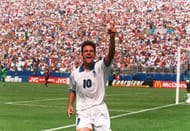
The 2018 World Cup has been a tough one for African nations as not a single team from the continent made the knockout stages (though Senegal and Nigeria came close). Twenty years, things were not very different as only one team from Africa made the knockout stages: Nigeria. Yet what a team it was as the likes of Jay-Jay Okocha led the Golden Eagles to first place in a group that included Argentina and Hristo Stoichkov’s Bulgaria.
Their reward for finishing first in their group? A matchup against World Cup giants Italy. That didn’t daunt Nigeria as after a cagey start, they got off the mark with a scruffy corner goal finished by Emmanuel Amunike. Despite an assault by an Italian team led by the Baggio (Roberto started and Dino came off the bench) brothers, Nigeria survived. The Golden Eagles’ chances got even better when Italy’s other substitute Gianfranco Zola was sent off in the 75th minute.
At that point, Italy’s World Cup seemed to be over. However then, the magic of the Divine Ponytail took over. Roberto Baggio smashed in a low shot from the edge of the box and Italy were level again. As the match went into extra time, Nigeria were still favourites considering their opponents had been reduced to ten men.
However, Baggio came up with another moment of magic as his chipped pass found Antonio Benarrivo who was brought down. Baggio converted the penalty and a magical comeback was complete. Italy progressed to the World Cup final where their tournament would ironically be ended by a (missed) Baggio penalty. Nigeria sure understood that feeling.
#9 2014 World Cup Round of 16: Netherlands 2-1 Mexico
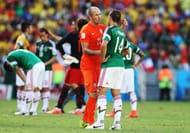
It seems cruel to even discuss the above game considering Mexico’s elimination to Brazil in Monday’s earlier match. After the game against Brazil, there was extensive discussion surrounding the refereeing (mainly pertaining to Neymar’s antics) and how it may have disadvantaged El Tri. Yet it did not compare to the outcry following Netherlands’s 2-1 victory over Mexico at the last World Cup. What was ignored in that discussion was the remarkable nature of Netherlands’ comeback.
The Oranje came into the game as strong favourites, having finished 2nd in the previous World Cup. They were also in good form, as they had decimated defending champions Spain 5-1 (remember that Van Persie header) in the group stages. However, Mexico started the game well as they were clearly the better team in the first half. Their performance was rewarded when Giovanni dos Santos smashed home a screamer to give the El Tri a lead.
The Dutch response was repelled for forty minutes as cult hero Guillherme Ochoa made save after save. However in the 88th minute, Dutch experience showed as Oranje hero Wesley Sneijder rifled home a goal after Mexico’s failure to clear a corner. Instead of sitting back and waiting for extra-time, the Dutch continued to attack.
Arjen Robben dribbled his way through the Mexican defence before going down under minimal contact. Klaas Jan Huntelaar converted the penalty to finish Netherlands’ version of the 1999 Champions League Final. Even then, that game will always be remembered for one thing: Robben’s “dive”.
#8 2002 World Cup Round of 16: South Korea 2-1 Italy
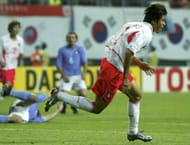
This game is almost a mirror copy of the aforementioned 1994 Nigeria-Italy match, except this time Italy were on the receiving end of a brilliant comeback. Hosts South Korea had begun the tournament well as they finished above the United States, Portugal and Poland to top their group. Meanwhile Italy had struggled as they suffered a shock loss to Croatia. Even then, the Azzurri were still considered favourites (for obvious reasons).
What followed was one of the most controversial games in World Cup history. The controversy started very early as South Korea were awarded an early penalty for some tussling in the penalty box. The uproar was diminished when Ahn Jung-Hwan missed the resulting penalty. Italy responded with the opening goal of the game. Nonetheless, South Korea continued fighting… quite literally as they were rather physical leading to several injuries on both sides.
By the 88th minute, Italy had survived the pummelling and seemed to be heading for a quarter-final against Spain. But Korean winger Seol Ki-Hyeon had other ideas as he took advantage of an Italian error to smash home an equalizer.
In extra-time, the game descended into farce as Francisco Totti was sent off harshly and Italy had a goal wrongly disallowed. Just as a penalty shoot-out seemed inevitable, former villain Ahn popped up to score the ‘golden goal’. Like No.9 on this list, this game will always be remembered for its referring- that still takes away nothing from an underdog comeback like South Korea’s.
#7 1990 World Cup Quarter-final: England 3-2 Cameroon
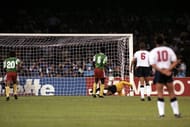
The bright spot in England’s last half-century of World Cup performances is the 1990 World Cup which remains the only time since 1966 that England have reached the semi-finals. They did this thanks to a rather incredible comeback that has been forgotten in footballing folklore.
Cameroon were the darlings of the 1990 World Cup as they became the first African team to advance to the quarter-finals of the World Cup. They featured the 38-year-old Roger Milla, the brilliant enigmatic striker. An efficient English side dominated the first half and a goal from David Platt gave them the lead.
At half-time, Milla was brought on and by the 60th minute, he earned a penalty that was converted by Emmanuel Kunde. Cameroon then took the lead with a superb team move as another substitute Eugene Ekeke poked the ball past Peter Shilton. By the 83rd minute, Cameroon were still holding on to an improbable victory. It was then when Gary Lineker was upended as England won a spot-kick of their own. Lineker duly converted the penalty to take the game to extra-time where he won the game for the Three Lions with another spot-kick.
What propels this game above other similar games ranked below it is the stakes (a quarterfinal rather than a Round of 16). Cameroon were left wondering what if and even now no African team has reached the World Cup semi-final.
#6 2018 World Cup Round of 16: Belgium 3-2 Japan

Recency bias can often cloud our understanding of games and their importance. Even then, Belgium vs Japan featured one of the best comebacks in World Cup history. Only three other teams have ever come back from a 2-0 deficit to win a World Cup knockout game and two of those comebacks rank above this one in the list.
It was a game that had everything: an outstanding first-half defensive performance by Japan, a clinical finish by Genki Hamaguchi to put the underdogs ahead, one of the goals of the tournament from Takashi Inui, Belgium’s captain Eden Hazard missing several chances, a supreme header by Jan Vertonghen, a classic Marouane Fellaini equalizer and the perfect counter-attack displaying the industriousness of Kevin De Bruyne, the crossing of Thomas Meunier, the intelligence of Romelu Lukaku and the composure of Nacer Chadli. What else is there to say?
#5 1934 World Cup Final: Italy 2-1 Czechoslovakia
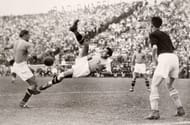
Ah, such a classic, remember the 1934 World Cup Final? Neither do it, let’s just say it was a few decades before I was born. Footage of the game is extremely grainy but by all accounts, it was a wonderful game. Scoreless until the 70th minute, Antonin Puc threw the game open when he opened the score for Czechoslovakia.
The Czechoslovaks seemed to be heading for victory in the 2nd ever World Cup while Italy were going to disappoint in front of 55,000 rabid Italian fans in Rome. Those supporters were to be satisfied when Raimundo Orsi equalized in the 81st minute. After that last-gasp equalizer, the game headed into extra-time where an Angelo Schiavo goal ensured the Jules Rimet Trophy for the hosts.
In the end, this was a game similar to those that finished 8th and 10th on this list but the importance of the World Cup final carries this game to 5th spot. Since then, the history of the two teams have been divergent- Italy have won four World Cups while Czechoslovakia only reached one more final in their history until the country was broken up in 1992.
#4 1970 World Cup Semi-final: Italy 4-3 West Germany
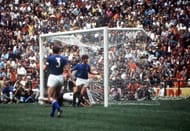
One of the greatest games in World Cup History- in fact, the 1970 semi-final between Italy and Germany has gone down in footballing folklore as the “Game of the Century”. Both teams had already made comebacks in their quarter-finals: Italy recovered from an early 1-0 deficit to smash hosts Mexico 4-1 while Germany beat England 3-2 in a game that features later on this list (spoiler alert!).
The game started quickly as Roberto Boninsegna gave Italy an early lead in the 8th minute. For the next 82 minutes, Italy managed to hold on against a brilliant attacking German side. Germany’s best player Franz Beckenbauer dislocated his arm but chose to keep playing in a sling rather than leave his team with 10 men. Beckenbauer’s bravery paid off as left-back Karl Heinz Schnellinger scored his first and last national team goal in injury-time.
As the game went to extra-time, legend Gerd Muller gave Germany the lead as they completed a brilliant comeback. But that is not the comeback that is ranked 4th in this list- instead, it is what followed. Most teams would have given up after surrendering a 1-0 lead in injury time but not the Azzurri. In the 98th minute, a clever Italian free kick routine resulted in defender Tarcisio Burgnich equalizing. Within six minutes, Luigi Riva gave Italy the lead and their comeback was complete.
But the game wasn’t as Gerd Muller equalized a few minutes later. However there was to be no “third” comeback as Gianni Rivera rifled home the winner within a minute. What made Italy’s comeback so special was how they recovered from Germany’s initial fightback.
#3 1970 World Cup Quarter-final: West Germany 3-2 England
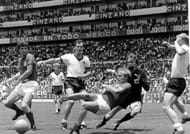
Where England’s misery really started. The Three Lions have a checked history in the World Cup as fifty-two years of disappointing tournaments since 1966, several of which were at the hands of Germany. On 14th June 1970, the opposite was true. England were defending World Cup champions, having defeated Germany 4-2 in the final. 67 minutes into the game, it seemed as if history was going to repeat itself. Goals from Alan Mullery and Martin Peters had given England a comfortable 2-0 lead.
It took one of the greatest players in history Franz Beckenbauer to spur an improbable comeback. The German defender dribbled past an English player before rifling home a goal outside the box. But Die Mannschaft were not happy with a consolation goal as striker Uwe Seeler scored a scruffy equalizer. In extra-time, Germany pushed for a winner as Jurgen Grabowski’s cross was headed back across the box for a Gerd Muller tap-in.
Thus, ended a remarkable comeback- Germany had recovered from 2-0 to reach the semi-finals while also eliminating the defending champions (and avenging 1966) at the same time. Germany’s World Cup came to an end in the aforementioned game against Italy, where they were at the receiving end of a similarly remarkable comeback.
Nonetheless, this comeback in retrospect feels bigger than that particular tournament- since then Germany have become footballing giants while the English national team has transformed from perennial contenders to perennial disappointments (though that might change in Russia).
#2 1966 World Cup Quarter-final: Portugal 5-3 North Korea
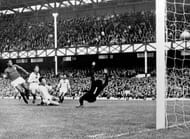
In terms of the sheer scale of the comeback, this game ranks above all else in World Cup knockout stage history- no team has ever recovered from a three-goal deficit. Like 2010, North Korea arrived in the 1966 World Cup as one of the most mysterious teams in the tournament (none of their players were located outside their country). They shocked the footballing world (like their southern neighbours would 36 years later) with a dogged 1-0 win over Italy that placed them in the knockout stages ahead of the Azzurri.
Facing them in the quarter-finals was another World Cup debutant: Portugal. The latter were considered favourites because of the mercurial talents of Eusebio. The North Koreans got off to the best possible start when Pak Seung-Zin scored a screamer within the first minute. It would only get better for the minnows as two excellent team goals put them 3-0 up within the first 25 minutes.
Almost everyone in the stadium was in shock except for Eusebio. The striker pulled one back with an excellent finish. By the end of the half, Eusebio pulled another back through a penalty. North Korea defended desperately to prevent an equalizer but Eusebio was determined to end their fairy-tale run as he smashed him a third for his hat-trick.
But the Black Panther wasn’t done just yet. Three minutes after equalizing, he made a brilliant run from the halfway line to the six-yard box only to be brought down by a defender. Converting the ensuing penalty, Eusebio had completed one of the greatest comebacks in football history (qualifiers not needed). A final goal by Jose Augusto sealed the outcome and ensured Portugal 1966’s place in footballing history.
#1 1954 World Cup Final: West Germany 3-2 Hungary
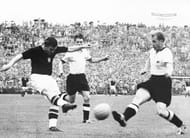
There are some very rare teams in sports who dominate the competition to such an extent that matching up to them feels futile. One such side was Hungary of the early 1950s. From 1950 to the 1954 World Cup final, the Mighty Magyars won 26 out of 30 games- drawing the other four. They romped to the Olympic Gold and crushed a much-favoured English team in 1953’s “match of the century”.
In the four World Cup games leading up to the final, Hungary scored 25 goals in four games- defeating a strong Brazil team in a very physical game before sneaking past defending champions Uruguay. The scariest thing about them? They had played their last three games without their best player Ferenc Puskas.
Puskas was back for the final against a West Germany side that the “Golden Team” had already crushed 8-3 in the group stages. So when Puskas and Zoltan Czibor to put Hungary 2-0 ahead within eight minutes, not many were surprised.
At that point, it seemed as if Hungary were going to romp to the World Cup. But the Germans had some very different ideas as Max Morlock capitalized on a defensive mistake by the Hungarians to pull a goal back. Nervousness crept through the Hungarian team and they soon conceded an equalizer from a corner.
Over the next 60 minutes, Hungary besieged the German goal as they missed chance after chance to take the lead. The likes of Puskas, Sandor Kocsis and Czibor rank among the best finishers in history but on that one day, they could not put the ball in the net. In the 84th minute, Germany completed the comeback as Helmut Rahn rifled home the second goal of the tournament.
What makes this the greatest knockout stage comeback in World Cup History is the simple unlikelihood of a relatively weak Germany side coming back to defeat one of the greatest international teams in footballing history. There is a reason why they call it the ‘Miracle of Bern’.
